英语专业四级语法和词汇总结精修订
- 格式:docx
- 大小:156.83 KB
- 文档页数:12
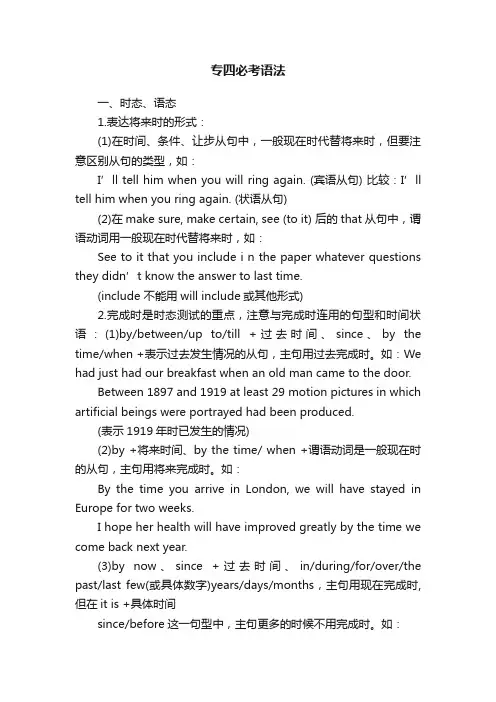
专四必考语法一、时态、语态1.表达将来时的形式:(1)在时间、条件、让步从句中,一般现在时代替将来时,但要注意区别从句的类型,如:I’ll tell him when you will ring again. (宾语从句) 比较:I’ll tell him when you ring again. (状语从句)(2)在make sure, make certain, see (to it) 后的that从句中,谓语动词用一般现在时代替将来时,如:See to it that you include i n the paper whatever questions they didn’t know the answer to last time.(include 不能用will include或其他形式)2.完成时是时态测试的重点,注意与完成时连用的句型和时间状语:(1)by/between/up to/till +过去时间、since、by the time/when +表示过去发生情况的从句,主句用过去完成时。
如:We had just had our breakfast when an old man came to the door.Between 1897 and 1919 at least 29 motion pictures in which artificial beings were portrayed had been produced.(表示1919年时已发生的情况)(2)by +将来时间、by the time/ when +谓语动词是一般现在时的从句,主句用将来完成时。
如:By the time you arrive in London, we will have stayed in Europe for two weeks.I hope her health will have improved greatly by the time we come back next year.(3)by now、since +过去时间、in/during/for/over/the past/last few(或具体数字)years/days/months,主句用现在完成时, 但在it is +具体时间since/before这一句型中,主句更多的时候不用完成时。
![英语专业四级考试语法精讲[1]](https://uimg.taocdn.com/a66f1368561252d380eb6e8d.webp)
英语专业四级考试—语法精讲虚拟语气第一部分:概述虚拟语气类型(宾语从句;状语从句;名词性从句(主语从句,同位语从句,表语从句);定语从句;特殊类型(感叹句);省略if 的虚拟法(倒装))ExamplesThe rapid change of society requires that college students adapt to the world outside campus by getting to know the society.I would rather that you did nothing for the time being.I wish that I were a student again.I wished that I had followed his suggestion.名词性从句中的虚拟主语从句(it is +adj./p.p that)同位语从句(The +n. that )表语从句(n. +be that)省略if 的虚拟法(倒装)(1)虚拟语气中如果从句引导词if / whether 省略,从句中需要倒装,提前助动词(系动词)或情态动词。
Eg. If it should rain tomorrow, we would not be able to have the sports meeting.=Should it rain tomorrow, we should not be able to have the sports meeting.省略if 的虚拟法(倒装)(2)Eg. Whether it (may) be fine or rainy, we would have the sports meeting. =Be it fine or rainy, we would have the sports meeting.If she had been given more information, she could have answered the questions.=Had she been given more information, she could have answered the questions.第二部分详解&总结虚拟语气的动词标志―insist, suggest, require, request, demand, propose, prefer, maintain, move,urge, recommend, command, order‖等动词表“建议、愿望”时,其后宾语从句中谓语动词要用虚拟语气。
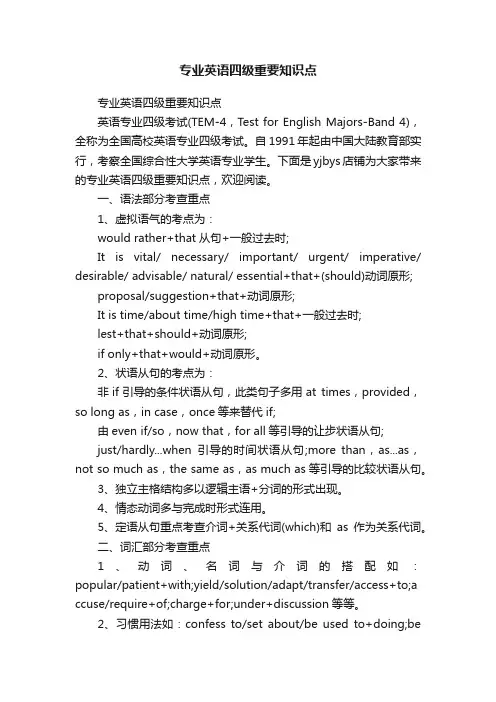
专业英语四级重要知识点专业英语四级重要知识点英语专业四级考试(TEM-4,Test for English Majors-Band 4),全称为全国高校英语专业四级考试。
自1991年起由中国大陆教育部实行,考察全国综合性大学英语专业学生。
下面是yjbys店铺为大家带来的专业英语四级重要知识点,欢迎阅读。
一、语法部分考查重点1、虚拟语气的考点为:would rather+that从句+一般过去时;It is vital/ necessary/ important/ urgent/ imperative/ desirable/ advisable/ natural/ essential+that+(should)动词原形;proposal/suggestion+that+动词原形;It is time/about time/high time+that+一般过去时;lest+that+should+动词原形;if only+that+would+动词原形。
2、状语从句的考点为:非if引导的条件状语从句,此类句子多用at times,provided,so long as,in case,once等来替代if;由even if/so,now that,for all等引导的让步状语从句;just/hardly...when引导的时间状语从句;more than,as...as,not so much as,the same as,as much as等引导的比较状语从句。
3、独立主格结构多以逻辑主语+分词的形式出现。
4、情态动词多与完成时形式连用。
5、定语从句重点考查介词+关系代词(which)和as作为关系代词。
二、词汇部分考查重点1、动词、名词与介词的搭配如:popular/patient+with;yield/solution/adapt/transfer/access+to;a ccuse/require+of;charge+for;under+discussion等等。
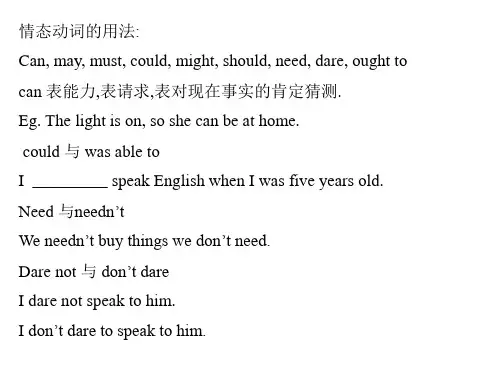
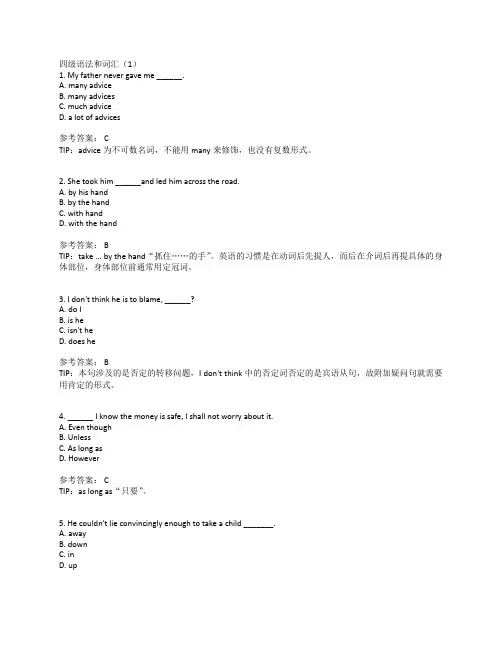
四级语法和词汇(1)1. My father never gave me ______.A. many adviceB. many advicesC. much adviceD. a lot of advices参考答案: CTIP:advice为不可数名词,不能用many来修饰,也没有复数形式。
2. She took him ______and led him across the road.A. by his handB. by the handC. with handD. with the hand参考答案: BTIP:take ... by the hand“抓住……的手”。
英语的习惯是在动词后先提人,而后在介词后再提具体的身体部位,身体部位前通常用定冠词。
3. I don't think he is to blame, ______?A. do IB. is heC. isn't heD. does he参考答案: BTIP:本句涉及的是否定的转移问题,I don't think 中的否定词否定的是宾语从句,故附加疑问句就需要用肯定的形式。
4. ______ I know the money is safe, I shall not worry about it.A. Even thoughB. UnlessC. As long asD. However参考答案: CTIP:as long as“只要”。
5. He couldn't lie convincingly enough to take a child _______.A. awayB. downC. inD. up参考答案: CTIP:take in“欺骗”,take away“拿走”,take down“取下来,记下来”,take up“从事”。
6. The parents were worried about Dorothy because no one was aware ______ she had gone.A. where thatB. of whereC. whereD. the place参考答案: BTIP:aware一般有两个结构: be aware of something和be aware that-clause,在此选择of后加名词从句,相当于第一个结构。
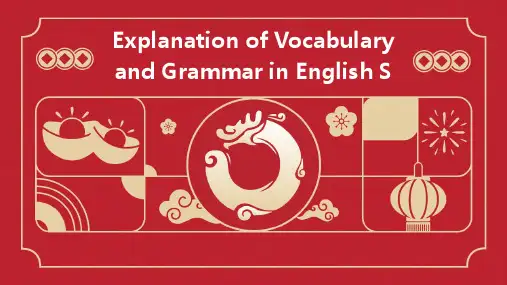
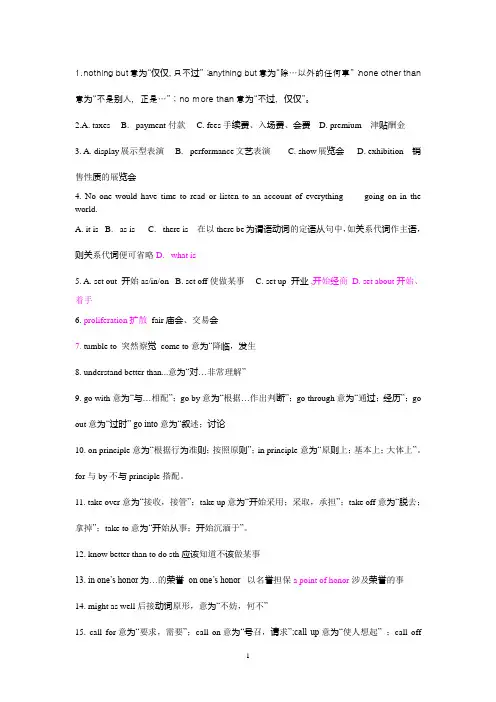
1.nothing but意为“仅仅,只不过”;anything but意为“除…以外的任何事”;none other than 意为“不是别人,正是…”;no more than意为“不过,仅仅”。
2.A. taxes B. payment付款 C. fees 手续费、入场费、会费 D. premium津贴酬金3. A. display展示型表演 B. performance文艺表演 C. show展览会 D. exhibition销售性质的展览会4. No one would have time to read or listen to an account of everything ____going on in the world.A. it isB. as isC. there is 在以there be为谓语动词的定语从句中,如关系代词作主语,则关系代词便可省略D. what is5. A. set out 开始 as/in/on B. set off使做某事 C. set up 开业,开始经商D. set about开始、着手6. proliferation 扩散fair庙会、交易会7. tumble to 突然察觉come to意为“降临,发生8. understand better than...意为“对…非常理解”9. go with意为“与…相配”;go by意为“根据…作出判断”;go through意为“通过;经历”;go out意为“过时” go into意为“叙述;讨论10. on principle意为“根据行为准则;按照原则”;in principle意为“原则上;基本上;大体上”。
for与by不与principle搭配。
11. take over意为“接收,接管”;take up意为“开始采用;采取,承担”;take off意为“脱去;拿掉”;take to意为“开始从事;开始沉湎于”。
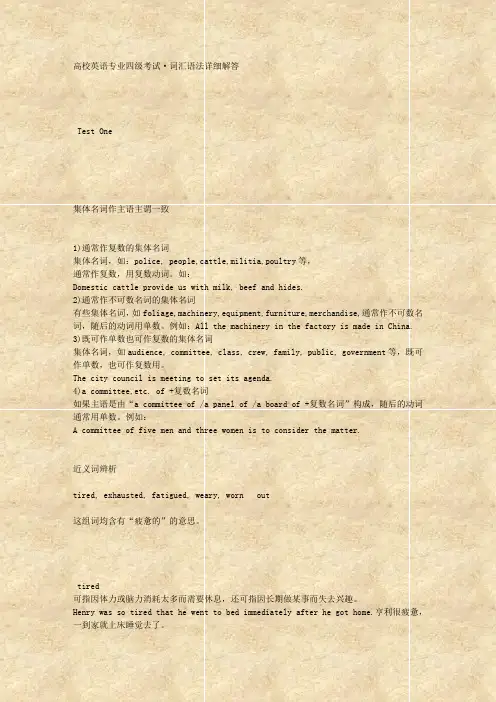
高校英语专业四级考试·词汇语法详细解答Test One集体名词作主语主谓一致1)集体名词,如:police, people,cattle,militia,poultry等,Domestic cattle provide us with milk, beef and hides.2)有些集体名词,如foliage,machinery,equipment,furniture,merchandise,通常作不可数名词,随后的动词用单数。
例如:All the machinery in the factory is made in China. 3)集体名词,如audience, committee, class, crew, family, public, government等,既可The city council is meeting to set its agenda.4)a committee,etc. of +如果主语是由“a committee of /a panel of /a board of +复数名词”构成,随后的动词A committee of five men and three women is to consider the matter.tired, exhausted, fatigued, weary, worn outtired可指因体力或脑力消耗太多而需要休息,还可指因长期做某事Henry was so tired that he went to bed immediately after he got home.亨利很疲惫,exhaustedThe exhausted engineer fell asleep on the bus.精疲力竭的工程师在公共汽车上睡着了。
fatigued所表达的疲劳程度比tired和weary强,表示由于过度劳累而引起疲乏,不能再继续下去。
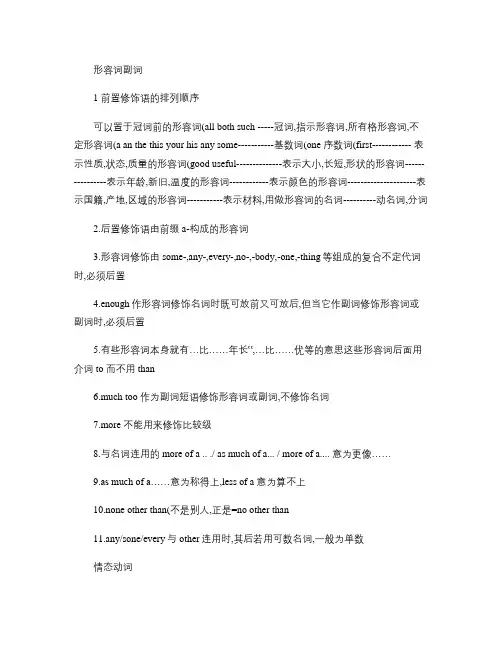
形容词副词1 前置修饰语的排列顺序可以置于冠词前的形容词(all both such -----冠词,指示形容词,所有格形容词,不定形容词(a an the this your his any some-----------基数词(one 序数词(first------------ 表示性质,状态,质量的形容词(good useful--------------表示大小,长短,形状的形容词----------------表示年龄,新旧,温度的形容词------------表示颜色的形容词---------------------表示国籍,产地,区域的形容词-----------表示材料,用做形容词的名词----------动名词,分词2.后置修饰语由前缀a-构成的形容词3.形容词修饰由some-,any-,every-,no-,-body,-one,-thing等组成的复合不定代词时,必须后置4.enough作形容词修饰名词时既可放前又可放后,但当它作副词修饰形容词或副词时,必须后置5.有些形容词本身就有…比……年长‟,…比……优等的意思这些形容词后面用介词to 而不用than6.much too 作为副词短语修饰形容词或副词,不修饰名词7.more 不能用来修饰比较级8.与名词连用的more of a .. ./ as much of a... / more of a.... 意为更像……9.as much of a……意为称得上,less of a 意为算不上10.none other than(不是别人,正是=no other than11.any/sone/every与other连用时,其后若用可数名词,一般为单数情态动词1.can 用于否定句cannot(helpbut表示不能不,只能(but后跟不带to的动词不定式2.must 表示禁止,一定不要时的否定式为mustn‟t当它表示有把握的推断时意为一定准是时它的否定形式为can‟t3.need doing=need to be done 这个句型表示被动意味4.need not have done sth 表示本来没有必要做某事(经常考虚拟语气1.It is (high/about/thetime... 谓语动词用过去式指现在或将来的情况表示早该做某事而现在已经有点晚了2.It is the first(second/thirdtime后的that从句中,谓语动词要用完成体来表示一种经验3.as if/though 的虚拟要点1 对当时事实的假设,从句谓语用过去式,be动词一律用were2对过去事实的假设,从句谓语用过去完成式3对未来事实的假设,从句谓语用would+动词原型专四语法重点总结比较级比较等级的含义英语中形容词与副词有三个比较等级,即原级,比较级和最高级。
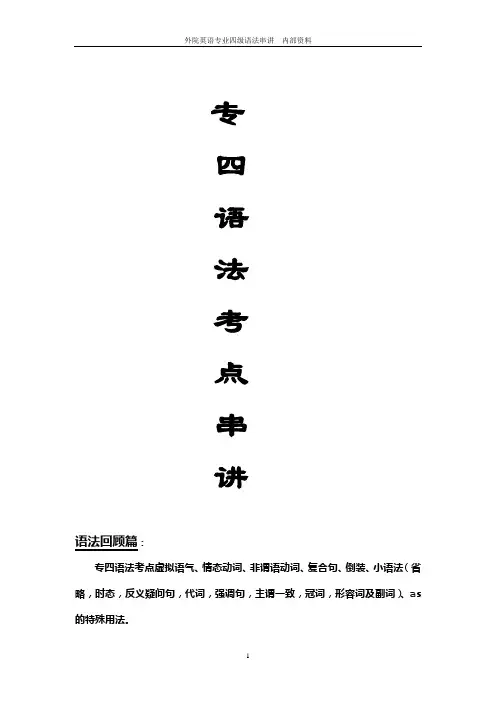
专四语法考点串讲语法回顾篇:专四语法考点虚拟语气、情态动词、非谓语动词、复合句、倒装、小语法(省略,时态,反义疑问句,代词,强调句,主谓一致,冠词,形容词及副词)、as 的特殊用法。
专四英语语法考点串讲之一虚拟语气一般说来,有下列几种考点需要考生注意(十考点及两备考点)考点1. 与现在事实相反从句谓语动词用did(be用were),主句谓语动词would(should,could,might)+do;考点2. 与过去事实相反从句谓语动词用had done,主句谓语动词用would(should,could,might)+ have done;例如:43.I _________the party much more if there hadn’t been quite such a crowd of people there.A. would enjoyB. will have enjoyedC. would have enjoyedD. will be enjoying49.All of us would have enjoyed the party much more if there _________ quite such a crowd of people there.A. weren’tB. hasn’t beenC. hadn’t beenD. wouldn’t考点3.与将来事实相反,从句谓语动词用:did(should+do或were + to do),主句谓语动词用:would(should,could,might)+do。
例如:43. If your car ___ any attention during the first 12 months, take it to an authorized dealer.(08年)• A. shall need C. would need• B. should need D. will need考点4. 时态的交叉现象,也就是主句与从句的动作发生在不同的时间段例如:If you had gone to see the doctor,you would be all right now.你要是早去看病,你现在就没事了。
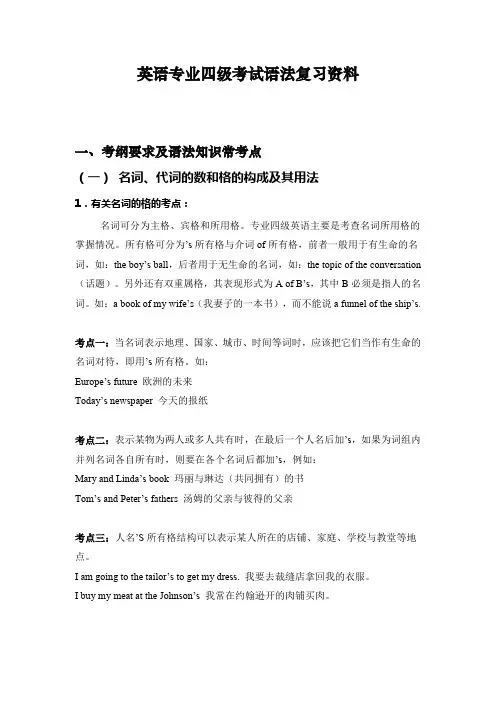
英语专业四级考试语法复习资料一、考纲要求及语法知识常考点(一)名词、代词的数和格的构成及其用法1.有关名词的格的考点:名词可分为主格、宾格和所用格。
专业四级英语主要是考查名词所用格的掌握情况。
所有格可分为’s所有格与介词of所有格,前者一般用于有生命的名词,如:the boy’s ball,后者用于无生命的名词,如:the topic of the conversation (话题)。
另外还有双重属格,其表现形式为A of B’s,其中B必须是指人的名词。
如:a book of my wife’s(我妻子的一本书),而不能说a funnel of the ship’s.考点一:当名词表示地理、国家、城市、时间等词时,应该把它们当作有生命的名词对待,即用’s所有格。
如:Europe’s future 欧洲的未来Today’s newspaper 今天的报纸考点二:表示某物为两人或多人共有时,在最后一个人名后加’s,如果为词组内并列名词各自所有时,则要在各个名词后都加’s,例如:Mary and Linda’s book 玛丽与琳达(共同拥有)的书Tom’s and Peter’s fathers 汤姆的父亲与彼得的父亲考点三:人名’S所有格结构可以表示某人所在的店铺、家庭、学校与教堂等地点。
I am going to the tailor’s to get my dress. 我要去裁缝店拿回我的衣服。
I buy my meat at the Johnson’s 我常在约翰逊开的肉铺买肉。
They took part in the birthday party at Tom’s. 他们参加了在汤姆家举行的生日宴会。
2. 有关名词数的考点:考点一:复合名词的复数:一般而言,我们把核心词变为复数形式即可,如:passers-by, mothers-in-law; assistant directors;girl friends,但当修饰词是man,woman时,复合词各组成部分都要变为复数,例如:menservants,womenservants考点二:复数形式的名词用于单数概念,其谓语动词用单数。
形容词副词1 前置修饰语的排列顺序可以置于冠词前的形容词(all both such -----冠词,指示形容词,所有格形容词,不定形容词(a an the this your his any some-----------基数词(one 序数词(first------------ 表示性质,状态,质量的形容词(good useful--------------表示大小,长短,形状的形容词----------------表示年龄,新旧,温度的形容词------------表示颜色的形容词---------------------表示国籍,产地,区域的形容词-----------表示材料,用做形容词的名词----------动名词,分词2.后置修饰语由前缀a-构成的形容词3.形容词修饰由some-,any-,every-,no-,-body,-one,-thing等组成的复合不定代词时,必须后置4.enough作形容词修饰名词时既可放前又可放后,但当它作副词修饰形容词或副词时,必须后置5.有些形容词本身就有…比……年长‟,…比……优等的意思这些形容词后面用介词to 而不用than6.much too 作为副词短语修饰形容词或副词,不修饰名词7.more 不能用来修饰比较级8.与名词连用的more of a .. ./ as much of a... / more of a.... 意为更像……9.as much of a……意为称得上,less of a 意为算不上10.none other than(不是别人,正是=no other than11.any/sone/every与other连用时,其后若用可数名词,一般为单数情态动词1.can 用于否定句cannot(helpbut表示不能不,只能(but后跟不带to的动词不定式2.must 表示禁止,一定不要时的否定式为mustn‟t当它表示有把握的推断时意为一定准是时它的否定形式为can‟t3.need doing=need to be done 这个句型表示被动意味4.need not have done sth 表示本来没有必要做某事(经常考虚拟语气1.It is (high/about/thetime... 谓语动词用过去式指现在或将来的情况表示早该做某事而现在已经有点晚了2.It is the first(second/thirdtime后的that从句中,谓语动词要用完成体来表示一种经验3.as if/though 的虚拟要点1 对当时事实的假设,从句谓语用过去式,be动词一律用were2对过去事实的假设,从句谓语用过去完成式3对未来事实的假设,从句谓语用would+动词原型专四语法重点总结比较级比较等级的含义英语中形容词与副词有三个比较等级,即原级,比较级和最高级。
独立主格结构独立主格结构(Independent Genitive)有两部分组成,前一部份是名词或者代词,后一部分是非谓语动词(不定式、动名词和分词)或形容词、副词、或介词短语。
前后两部分具有逻辑主谓关系。
独立主格结构在句中做状语,多用于书面语。
独立主格结构本身不是句子,在句子中作状语,表示时间、原因、条件、伴随、目的等。
非谓语动词作状语,其逻辑主语须与主句主语保持一致。
若不一致,非谓语动词形式须另带主语,从而构成复合结构的形式作状语。
这种结构称为“独立结构”。
其中,非谓语动词主动用现在分词,被动用过去分词。
非谓语动词及其短语前面带有逻辑主语,逻辑主语的代词又是主格,故常称为“独立主格”。
“独立结构”在句中起状语作用,相当于状语从句,表示时间、原因、条件、方式或伴随等情况。
功能独立主格结构主要用于描绘性文字中,其作用相当于一个状语从句,常用来表示时间、原因、条件、行为方式或伴随情况等。
例如:表示时间The meeting being over, all of us went home. 开完会后我们都回家了。
Her work being done, she sat down for a cup of tea. 她干完了活,坐下来喝茶。
表示条件The condition being favorable, he may succeed. 若条件有利,他或许能成功。
表示原因There being no taxis, we had to walk. 没有出租车,我们只好步行。
He wrapped her up with great care, the night being dark and frosty. 夜又黑又冷,所以他把她裹得严严实实的。
表示伴随情况Almost all metals are good conductors, silver being the best of all. 几乎所有的金属都是良导体,而银则是最好的导体。
英语专业四级语法专题讲解英语专业四级考试对于语法知识的要求非常高,只有掌握了扎实的语法基础,才能够在考试中取得好成绩。
本文将针对英语专业四级考试中常见的语法问题进行分析和讲解,帮助考生更好地应对考试。
一、时态时态是英语语法中的基础知识,常出现在四级考试的试题中。
英语中常见的时态有一般现在时、一般过去时、一般将来时、现在进行时、过去进行时、现在完成时等,每种时态都有其特定的用法和表示方式。
1. 一般现在时一般现在时表示经常性或习惯性的动作,也可以表示客观事实等。
例句1:I usually get up at 7 o'clock in the morning.例句2:Water boils at 100 degrees Celsius.2. 一般过去时一般过去时表示在过去某个时间发生的动作或存在的状态。
例句1:I watched a movie last night.例句2:He lived in Paris for two years.3. 一般将来时一般将来时表示将要发生的动作或存在的状态,常与表示将来的时间状语连用。
例句1:I will visit my grandparents next weekend.例句2:She is going to travel around the world after graduation.4. 现在进行时现在进行时表示现在正在进行的动作。
例句1:They are studying in the library now.例句2:I am reading a book at the moment.5. 过去进行时过去进行时表示过去某个时间正在进行的动作。
例句1:She was cooking dinner when I arrived home.例句2:I saw him while he was walking in the park.6. 现在完成时现在完成时表示过去发生的动作对现在造成的影响或结果。
英语知识点总结专四1. GrammarGrammar is an essential part of learning any language, including English. Some key topics in English grammar that are important for the PETS exam include:- Parts of speech: understanding the different parts of speech, such as nouns, verbs, adjectives, adverbs, and conjunctions, is crucial for constructing grammatically correct sentences.- Tenses: understanding the different tenses, including present, past, and future, as well as their various forms, is important for expressing actions and events accurately.- Sentence structure: knowing how to construct sentences using subject-verb-object order, as well as different types of sentence structures (e.g., simple, compound, and complex sentences), is important for effective communication in English.2. VocabularyA strong vocabulary is essential for understanding and expressing ideas in English. Some key areas of vocabulary that are important for the PETS exam include:- Word families: understanding the relationships between words, such as roots, prefixes, and suffixes, can help expand your vocabulary and understand new words more easily.- Word formation: knowing how to form new words from existing ones, such as through affixation or compounding, is important for expanding your vocabulary and understanding the meaning of unfamiliar words.- Collocations: learning common word combinations and phrases, or collocations, is important for using English more fluently and accurately.3. ReadingReading is an important skill for understanding written English and is a key component of the PETS exam. Some important reading skills for the PETS exam include:- Skimming and scanning: these are techniques for quickly locating specific information in a text, such as key words or phrases, without reading the entire text in detail.- Comprehension: understanding the main ideas, supporting details, and overall meaning of a text is important for answering comprehension questions and summarising the information.4. WritingWriting is an essential skill for expressing ideas and information in English. Some important writing skills for the PETS exam include:- Organisation: structuring your writing logically, with a clear introduction, body, and conclusion, is important for conveying your ideas effectively.- Coherence and cohesion: using appropriate linking words and transitional phrases to connect ideas and maintain the flow of your writing is crucial for producing well-structured and cohesive texts.5. ListeningListening is a key skill for understanding spoken English and is an important part of the PETS exam. Some important listening skills for the PETS exam include:- Understanding main ideas: identifying the main topic, key points, and supporting details in spoken texts is important for answering comprehension questions and summarising the information.- Note-taking: taking effective notes while listening to spoken texts, such as lectures or conversations, can help you remember and understand the information more easily.6. SpeakingSpeaking is an essential skill for communicating in English and is a key component of the PETS exam. Some important speaking skills for the PETS exam include:- Fluency and coherence: speaking confidently and smoothly, with a clear flow of ideas and appropriate linking words, is important for expressing yourself effectively.- Pronunciation and intonation: speaking clearly and correctly, with accurate pronunciation and appropriate intonation, is crucial for being understood and communicating fluently in English.In conclusion, there are many important knowledge points to consider when learning English for the PETS exam. These points cover a range of areas, including grammar, vocabulary, reading, writing, listening, and speaking. By mastering these key knowledge points, you can improve your English language skills and prepare effectively for the PETS exam. Good luck with your studies, and we wish you success in your English language learning journey!。
一、考大纲求及语法知识常考点(一)动词的基本时态、语态的构成及其用法动词的语态不可以用于被动语态的动词和短语1)在英语中,不及物动词不可以用于被动语态,但有些不及物动词(包含短语)简单惹起误用。
如:appear,belongto,die,escape,fall,happen,last,succeed,occur,takeplace,consistof。
Oursuccessbelongstoallthepeoplepresent我.们的成功属于在坐的每个人。
2)某些表示状态或特色的及物动词,如:become,contain,cost,fit,have,resemble,suit也没有被动语态。
2)少量动词的主动语态有时有被动的意思(专业四级英语重要考点)例1:Thebookissellingremarkablywell.这本书卖得很好例2:Thesongsoundsverybeautiful.这首歌听起来很优美。
能这样用的动词还有read(读起来),clean(擦起来),wash(洗起来),write(写起来)。
例3:Mywatchneedscleaning.(=Mywatchneedstobecleaned).能像need这样用的动词还有:want,require,deserve等。
例4:Themeatiscooking.例5:Theshopdoesn’t(open营业)onSunday.试比较:ThedoorwasopenedbyTom.1注意几个基本句型.(专业四级英语重要考点)Itissaid(听说).,Itisreported(据报导),Itiswidelybelieved(人们宽泛认为);Itisexpected(据希望,应当)Itisestimated据.估(计),Itwassaid ,ItwasbelievedItwasthought从前(人们认为...)。
ItissaidthatSydneyisbeautiful。
英语专业四级语法和词汇总结集团标准化工作小组 #Q8QGGQT-GX8G08Q8-GNQGJ8-MHHGN#but意为“仅仅,只不过”;anything but意为“除…以外的任何事”;none other than 意为“不是别人,正是…”;no more than意为“不过,仅仅”。
. taxes B. payment付款 C. fees手续费、入场费、会费 D. premium津贴酬金3. A. display展示型表演 B. performance文艺表演C. show展览会 D. exhibition销售性质的展览会4. No one would have time to read or listen to an account of everything ____going on in the world.A. it isB. as isC. there is 在以there be为谓语动词的定语从句中,如关系代词作主语,则关系代词便可省略D. what is5. A. set out?开始as/in/on B. set off使做某事 C. set up开业,开始经商 D. set about开始、着手6. proliferation?扩散fair庙会、交易会7. tumble to 突然察觉 come to意为“降临,发生8. understand better than...意为“对…非常理解”9. go with意为“与…相配”;go by意为“根据…作出判断”;go through意为“通过;经历”;go out意为“过时” go into意为“叙述;讨论10. on principle意为“根据行为准则;按照原则”;in principle意为“原则上;基本上;大体上”。
for与by不与principle搭配。
11. take over意为“接收,接管”;take up意为“开始采用;采取,承担”;take off意为“脱去;拿掉”;take to意为“开始从事;开始沉湎于”。
12. know better than to do sth应该知道不该做某事13. in one’s honor?为…的荣誉on one’s honor 以名誉担保a point of honor涉及荣誉的事?14. might as well后接动词原形,意为“不妨,何不”15. call for意为“要求,需要”;call on意为“号召,请求”;call up意为“使人想起” ;call off意为“取消,停止做”。
16. put up意为“宿夜”;put in 意为“度过,消磨(时间等)”;put down意为“写下,记录”;put on 意为“上演,演出”17. pay back?回报,报答pay for为…付出代价pay up全部付清pay off还清债务18. technical意为“技术的,技能的”;technological 意为“技术学的,工艺学的”;technique意为“技术,技能”,是名词;technology意为“技术(学),工艺(学)”,也是名词19. look out意为“向外看”;look around意为“环顾”;look up 意为“抬头望,查检”;look on意为“旁观”。
20. forsake?抛弃 take it out on sb. 意为“拿某人出气 have no business doing /to do something 意为“没有权力,没有理由做某事”21. lay up 意为“因痛(或伤残)卧床”,常用被动语态; lay out 意为“摆出,展开”;lay by 意为“储存”;lay down意为“牺牲,献出”22. fragment 意为“碎片,碎块”;piece意为“块,片”;bit意为“小片;小段”;slice意为“薄片;切片”23. live up to 意为“遵守,实践(诺言,原则)”;live on 意为“以…为生”;live through 意为“度过,经历过”;live with 意为“忍受;容忍”24. appeal to 意为“有感染力,有吸引力”;look into 意为“调查,观察”;give rise to意为“引起,导致”;go in for意为“爱好;从事,参与”25. delicate棘手的 impart意为“告诉;传授”26. The man sitting opposite me smiled dreamily, as if +不定式____something pleasant in the past.A. to rememberB. rememberedC. having been remembered?D. remembering27. It pains sb. to see...意为“看到…使某人感到痛心”28. lose track of 意为“失去与…的联系;失去…的线索”;trace意为“痕迹,遗迹”;trail 意为“踪迹;臭迹;足迹”;touch意为“接触”。
29. patch意为“补缀;修补”;mend意为“修理;修补”,比如鞋;repair意为“修理;修复”,比如机器;pitch意为“投;掷;扔”30. productivity 意为“生产力;生产率”;production意为“生产;制造”;product意为“产品”;produce意为“农产品”31. respectful意为“尊敬的;恭敬的”;respective意为“各自的,分别的”;respect是名词,意为“尊敬”;respectable意为“可敬的”32. slip意为“滑倒;滑落”;slide意为“滑行;光滑地移动”;split意为“裂开”;spill意为“溅出;流出”33. come up with意为“提出”;come out意为“结果是”;come round意为“来,前来”;come up to意为“达到,比得上”34. with reference to意为“有关,关于”;with the exception of意为“除…之外”;with the purpose of意为“目的是”; with a view to意为“目的是,为了(后跟动名词)”35. cope with意为“应付”;put up with意为“忍受,容忍”; submit to意为“服从,屈从”;comply with意为“照…办”36. neglect意为“忽视”;omit意为“省略,忽略(正式用语)”;miss意为“免去,漏掉(非正式用语);discard意为“丢弃,抛弃”37. allowances意为“差旅费”;income意为“收入”;wage意为“工资(常作复数,指按照合同,根据其劳动或所提供的服务,按小时,天数,每周或计量付给工资)”;pay“工资,薪金(泛指劳动所得的报酬)”。
38. cope with意为“应付”;set tle down意为“安居,专心于”;intervene in意为“介入,干涉”;interfere with意为“干涉,妨碍39. tangle with与…吵架40. correlate相互依存 undermine意为“暗中破坏;逐渐损害commence意为“开始41. culminate in意为“告终”,但强调以高潮结束;end in意为“以…而告终”;end up 意为“最后成了…”;come to可表示“苏醒,发生”等之意42. endow意为“赋予”,后接with;confer…on意为“授予,给予…”;equip…with意为“装备,配备…”;bestow…on意为“授予,赠予”43. elapse意为“时间消逝”;expire意为“(期限等)终止;开始无效”;terminate意为“终止”,相当于end,但比end正式,为及物动词44. hamper意为“妨碍,阻碍,牵制”,搭配词组有:hamper sb. from(doing)/in sth.意为“妨碍某人(干)某事”45. affiliate意为“使隶属于”;conflict 意为“冲突”;inflict与afflict容易混淆,前者指将不受欢迎的事强加于(人),而后者指引起身体或精神上的痛苦。
46. differentiate的主语也可以是人,此时可与distinguish或discriminate换用。
此外,differentiate的主语还可以是具备某种品质或特征的事物;distinguish指通过辨别事物的特征区别其他事物,通常与betweenong/from连用;discriminate指分辨出细微差别;distinguish与discriminate的主语通常为“人”;differ意为“不同”。
47. catch on意为“理解”,用于口语;snatch up意为“抓住某物”;summon up意为“鼓起(勇气等);watch out意为“当心,监视,注意”48. collisions意为“冲突”;combat意为“战斗”;contradiction意为“(意见等)相互矛盾,冲突”;conflict意为“冲突(指处于战争状态或激烈的争吵)”49. go in for意为“从事,进行”;go back on 意为“违背”;go through with意为“将…进行到底”;go along with意为“赞同,支持”50. cut short意为“打断(某人)”;put somebody through意为“为某人接通电话”;turn someone out意为“驱逐某人,使某人离开”;give someone up 意为“把某人交给,招供出某人”51. barren意为“不毛的”;void意为“无效的,空的”;virgin意为“未经开发的”;wretched意为“可怜的,讨厌的,拙劣的”52. see to意为“负责处理”;prey on意为“捕食,折磨”;take on意为“承担”,后接表示“任务”之类的词”;get at意为“意指,意思是”53. keep off意为“远离”;take off意为“起飞”;get off意为“(从汽车、火车等交通工具)下来;set off意为“激起,引起,动身,启程”54. feeble意为“软弱的”;trivial意为“微不足道的”;fatal意为“致命的”;tentative意为“尝试性的”。
55. compact意为“小巧的 ingenious意为“奇妙的 liability意为“不利条件”56. literal意为“字面的”;literary意为“文学的”;liberal意为“自由的”;linear意为“线性的”57. scale down意为“按比例缩减,相应缩减”;look down upon意为“看不起,轻视”;break down意为“捣毁,拆除”;keep down意为“压缩,限制”58. encounter意为“遭遇,遇到”;entail意为“使成为必要,需要”;enclose意为“把…装入信封;附上”;endure意为“持续,持久”59. be situated in(on)意为“座落在…;位于…”;lie变成lied时,不是“座落,位于”的意思,而是“撒谎”;station意为“驻扎”;place意为“放置,安置”60. institution意为“制度,习俗”;commitment意为“承诺,约定”;limitation意为“限制,局限”;regulation意为“规则,规章”61. “ought+to+V”这一形式,在变成反意疑问句时,只要在ought后加not,然后再加相应的主语即可62. capability意为“能力;才能;潜在能力”,常用于人所具有的从事某项工作或达到某一目的的能力。